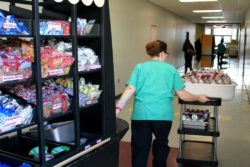Osienski Bill Would Increase Options for School Breakfast Programs
June 8, 2016
In an effort to extend the state’s successful public school breakfast program to more students, Rep. Ed Osienski introduced legislation yesterday that would move Delaware schools to implement new plans for serving breakfast beyond a traditional cafeteria meal service.
While schools typically serve breakfast before school starts, many students may miss this opportunity to eat breakfast for a variety of reasons, such as tight morning arrival times and the social stigma attached to the traditional school breakfast program. According to the American Academy of Pediatrics, as many as 12 percent of school-aged children skip breakfast.
House Bill 408 would direct Delaware schools to adopt proven “Alternative Service Models” that have been shown to increase the number of students who eat breakfast at school, which in turn leads to better attendance rates, a reduction in disciplinary problems, and improved test scores, research has shown.
“Breakfast may be available in every Delaware school, but we know that many kids who need that healthy meal to start the day still aren’t getting it – and we’re not just talking about students from needy families,” said Rep. Osienski, D-Newark. “We’ve seen how successful school breakfast programs can be when schools and policymakers think outside the box, and we want that success in our state.”
Alternatives to the traditional school breakfast service include “Breakfast in the Classroom” and “Second Chance Breakfast,” which give students the opportunity to obtain breakfast for a period of time after school starts, and “Grab and Go Breakfast,” in which breakfast items are made available at carts or kiosks in other areas of the school apart from the cafeteria.
“We know student academic performance is tied to a number of factors outside the classroom, including the energy levels and attentiveness that come with being properly nourished,” said Sen. Bryan Townsend, D-Newark, prime Senate sponsor of HB 408. “Increasing the breakfast options for students who qualify is a common-sense and important step to helping kids prepare to learn at the outset of each school day.”
Schools across the country have demonstrated the effectiveness of alternative school breakfast service. The Los Angeles Unified School District saw participation rates rise by 89 percent a year after implementing “Breakfast in the Classroom” in most of its schools. LA schools with alternative breakfast service saw better attendance rates than schools with traditional breakfast programs.
Under HB 408, all Delaware public schools that participate in the federal National School Lunch Program would implement alternative breakfast models by school year 2017-18. High-poverty schools that currently provide meals to all students at no cost would be required to offer alternative breakfast service starting in school year 2016-17.
This legislation has the support of the Food Bank of Delaware, the Delaware State Education Association and the state Department of Education. The Controller General’s office has offered a preliminary fiscal note for HB 408 of less than $50,000.










